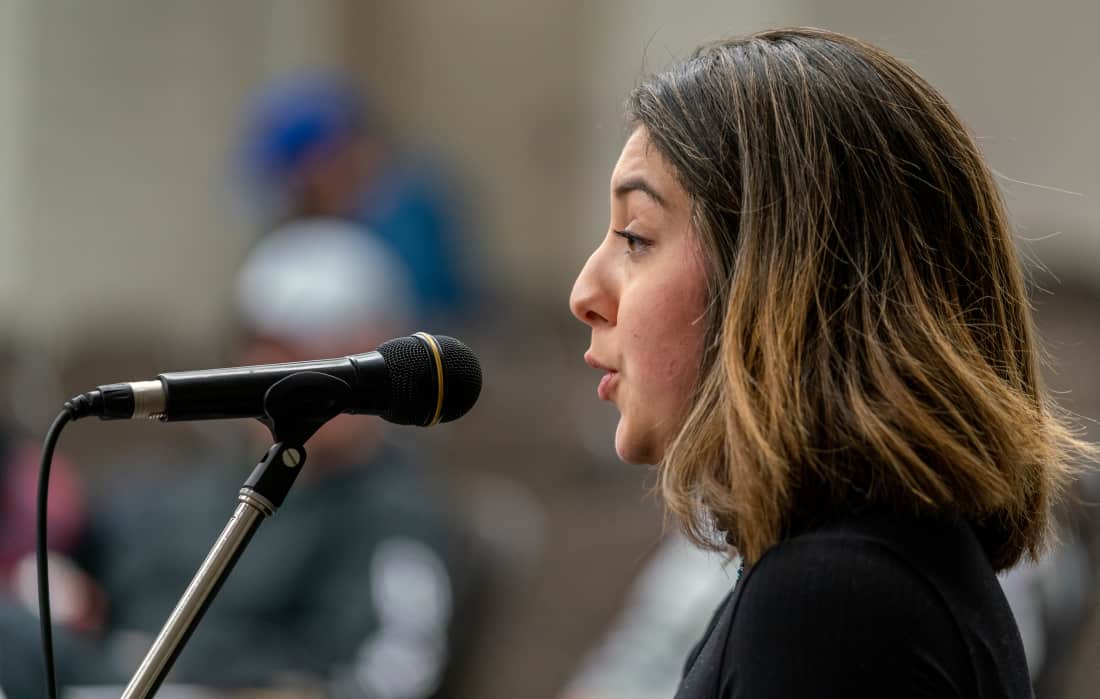
A student’s fight for change in the University of Saskatchewan Students’ Union bylaws has reached an impasse.
The bulk of the USSU Annual General Meeting on Nov. 21 was spent debating a proposed amendment to the union’s bylaws submitted by María Celeste Nuñez, an Ecuadorian student in environmental earth sciences. The other 14 items in the agenda were voted through without much deliberation; this was not the case for Nuñez’s submission.
Nuñez’s proposed amendment concerned the union’s rule that executive members cannot take more than six credits per term, which leaves all international students unable to run for the positions while on a work permit since they require a minimum of nine credits per term.
The amendment was to make this rule “not apply to executive members who are international students.” Nuñez says that if the USSU wants to honour their commitment to inclusivity, this is a change that needs to happen.
“It comes down to discrimination,” Nuñez said. “I don’t think that we need to enter a debate … this is about making the constitution inclusive.”
Autumn La-Rose Smith, USSU vice-president of student affairs, brought up the union’s concerns with the amendment.
“We are not in support of this change,” La-Rose Smith said. “We recognize that it does create barriers for certain demographics of people being able to run but there’s different ways we can facilitate that leadership.”
The USSU’s concerns were mostly based on the Saskatchewan Non-profit Corporations Act. It states that at least one of the directors of a student union must be a Canadian resident, and that a majority of the directors present at meetings must be Canadian residents, otherwise the international directors cannot conduct business.
This creates a possible scenario where if all members of an elected executive are international students, the union would cease to function for months until a by-election. However, Nuñez points to the U of S Graduate Students’ Association, that also functions under the Act, as an example to the contrary.
The GSA executive, who helped Nuñez draft her amendment, are all international students. Nuñez says they deal with the provincial regulations by appointing Canadians as silent directors that sit on meetings with the executive, allowing them to make decisions under the law.
Nuñez also points to the fact that the USSU has had international student executives in the past. The union had two international executives in the past 10 years, before reported changes to immigration law.
“The only reason I brought this up is because it changed and it’s been years since international students could run,” Nuñez said. “But they say ‘what if we have a problem?’ Well, you already had it before.”
“If those are the concerns, then there are solutions and we can see it happening all over Canada and here with our partners in the GSA. There’s no conflict.”
Despite this, the undergraduate students at the AGM voted to defeat the motion. In a conversation with the Sheaf on Nov. 22, Nuñez says that a debate was not the best way to educate the student voters about the issue, but she is hopeful for the future.
“We didn’t have enough time or power — I was nervous. In a debate environment, we did what we could,” Nuñez said. “I think, in a close-meeting with the executive, it’s going to be easier to tackle their concerns. I’ve done my research.”
Back in September, Nuñez and the USSU General Manager Caroline Cottrell met to discuss the ammendment but they did not reach a consensus. Despite the motion being defeated, Nuñez is content to now have a commitment from the USSU to continue the conversation.
LaRose-Smith regrets the lack of trust the international students felt in the USSU going into the AGM and hopes to mend this relationship.
“It saddens me to hear that … they felt like their hands were tied,” LaRose-Smith said. “I think that means there’s a lot of work [to be done] in relationship-building with students.”
This is the case for some of the students involved.
“I’m not sure if I can trust them anymore,” International Student Association President Akingbehin Akinwande said. “I’m not [feeling positive] after what I heard yesterday.”
Despite this, Nuñez remains optimistic. The fight has just started for the group and they intend to “hold the USSU accountable” to helping them until they succeed.
“If their problem with it was the wording [of the amendment] — and we have them on record — then I’m going to hold them accountable,” Nuñez said. “I believe that working with people works better than just me trying to impose my rights, but if they really don’t want to give them to me, then they are responsible for the consequences.”
The USSU executive is set to meet with the students behind the amendment this week and has committed to putting forward another motion before the next USSU elections.
“The executive, we recognize that this is a barrier and that is discrimination and it’s systemically racist,” LaRose-Smith said. “But by changing this, it does not address the law that we are required to follow.”
—
Ana Cristina Camacho/ News Editor
Photo: Heywood Yu
Leave a Reply